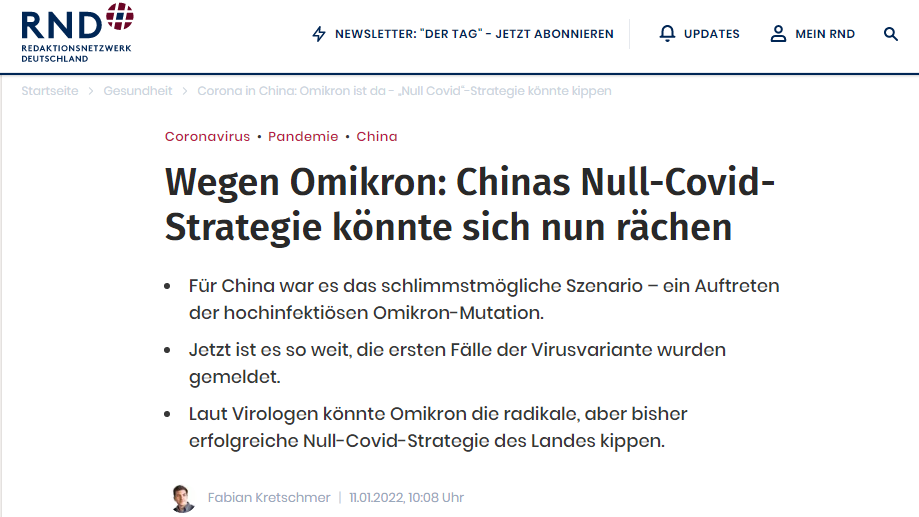
A screenshot of The RedaktionsNetzwerk Deutschland
A screenshot of The RedaktionsNetzwerk Deutschland
Editor's note: Anthony Moretti is an associate professor in the Department of Communication and Organizational Leadership at Robert Morris University. The article reflects the author's views and not necessarily those of CGTN.
If you spend any amount of time examining the U.S. media, then you know there is an almost daily drumbeat of stories questioning China's dynamic zero-COVID policy. I risk oversimplification when I describe the policy this way: The Chinese government remains resolute in swiftly stamping out new outbreaks when they happen. As a result, it will lock down cities where the virus has been discovered, mass test the residents and deep clean those locations. When the authorities deem the area safe, it will allow normal life to resume.
That policy is seen as draconian and almost "inhumane" in many countries, including the U.S., where – and as an American, I can attest to this – normal life resumed months ago with lockdowns considered absolutely intolerable. Not enough Americans see any need to sacrifice for the common good. Sure, millions of us will get vaccinated and wear masks, but in general, what "I want" is more relevant than what "you need."
The effects of this selfishness are obvious: Hospitals fill, and thousands upon thousands of people die. Recognizing that the death toll from the virus in the U.S. swelled past 850,000 as of January 16, there is every reason to believe that before 2022 ends, the number of Americans who would have died from the virus will top one million.
Yet what China is doing is "inhumane?" It would seem to me that keeping people alive is more humane than letting them carry on as if nothing is wrong.
Now, it is Germany's turn to take a look at what China is doing and ask whether the ends justify the means. The RedaktionsNetzwerk Deutschland (RND) media group, which is owned by the country's Social Democrats, whose leader Olaf Scholz became Germany's prime minister about a month ago, recently examined whether China's dynamic zero-COVID policy has run its course.
According to the RND, the Omicron variant of the virus "can no longer be stopped," meaning China's previous lockdown efforts will not suffice. The RND also claims that Sinopharm and Sinovac, China's domestically created vaccines, will not work against Omicron, heightening the fear that an out-of-control variant will sweep through China as it has through multiple countries.
Readers are left with the conclusion that China's "radical but so far successful" dynamic zero-COVID strategy was reaching its limit.

Sinovac, one of China's domestically created vaccines /CFP
Sinovac, one of China's domestically created vaccines /CFP
Ironically, the story was posted just a couple of days before the first Omicron case was reported in Beijing, the city that will soon welcome thousands of athletes, officials and journalists to the 2022 Winter Olympics. Facing growing concern about China's ability to deal with Omicron, the country's National Health Commission (NHC) confirmed that China is ready to combat Omicron.
"The Omicron variant will not affect the sensitivity of the current COVID-19 test kits in China," He Qinghua, a first-level inspector of the Disease Prevention and Control Bureau at the NHC, told reporters at a regular press conference on January 15. "This judgment was made by our experts after analysis and research."
The reality is this: The coronavirus pandemic remains under control in China, and while there will be inevitable hotspots where cases surge, the authorities and the public retain faith in prevention and containment policies. Meanwhile, the number of vaccine doses administered on the Chinese mainland is over 2.9 billion. "We" comes before "me" in China, and the results demonstrate collective care is working.
The RND report is not a hatchet job. It does explain why China's dynamic zero-COVID effort deserves applause. The story states, "For the absolute majority of Chinese, the risk of infection has not played a role in everyday life for over a year and a half, and thanks to the largely normal situation in most parts of the country, the economy has also been able to recover faster than in many other countries."
In addition, a person described as a "former senior WHO official who is now a Western diplomat in Beijing" is quoted as saying, "From an epidemiological point of view, the Chinese approach is quite impressive and very consistent."
Exactly. China need not defend its dynamic zero-COVID policy, which has guaranteed the health of millions of people. The data continues to show that China sits near the bottom in the total number of infections and deaths. A policy that asks the few to go into short-term lockdowns to benefit the many is one that more nations should have considered. But, of course, because it was China's policy, there was no way Western leaders, in particular, were going to adopt it.
Pity. The number of hospitalizations and deaths would have been much lower at this point. Balanced reporting, such as that from the RND report, would also be wise. But I would not count on that from U.S. mainstream media.
(If you want to contribute and have specific expertise, please contact us at opinions@cgtn.com.)

